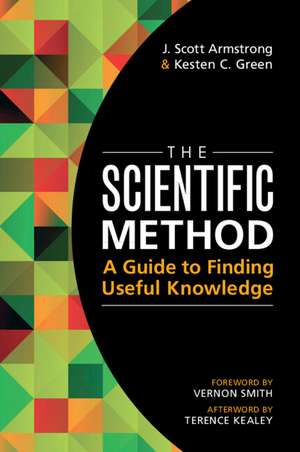The Scientific Method: A Guide to Finding Useful Knowledge
Autor J. Scott Armstrong, Kesten C. Greenen Limba Engleză Paperback – 13 iul 2022
| Toate formatele și edițiile | Preț | Express |
|---|---|---|
| Paperback (1) | 201.98 lei 6-8 săpt. | |
| Cambridge University Press – 13 iul 2022 | 201.98 lei 6-8 săpt. | |
| Hardback (1) | 525.66 lei 6-8 săpt. | |
| Cambridge University Press – 29 iun 2022 | 525.66 lei 6-8 săpt. |
Preț: 201.98 lei
Nou
Puncte Express: 303
Preț estimativ în valută:
38.65€ • 41.97$ • 32.47£
38.65€ • 41.97$ • 32.47£
Carte tipărită la comandă
Livrare economică 23 aprilie-07 mai
Preluare comenzi: 021 569.72.76
Specificații
ISBN-13: 9781009096423
ISBN-10: 1009096427
Pagini: 200
Dimensiuni: 152 x 227 x 14 mm
Greutate: 0.33 kg
Editura: Cambridge University Press
Colecția Cambridge University Press
Locul publicării:New York, United States
ISBN-10: 1009096427
Pagini: 200
Dimensiuni: 152 x 227 x 14 mm
Greutate: 0.33 kg
Editura: Cambridge University Press
Colecția Cambridge University Press
Locul publicării:New York, United States
Cuprins
1. Introduction; 2. Defining the scientific method; 3. Checklist for the scientific method; 4. Assessing the quality of scientific practice; 5. Scientific practice: Problem of advocacy; 6. Scientific practice: Problem of journal reviews; 7. Scientific practice: Problem of government involvement; 8. What is takes to be a good scientist; 9. How scientists can discover useful knowledge; 10. How scientists can disseminate useful findings; 11. How stakeholders can help science; 12. Rescuing science from advocacy; Afterword by Terence Kealey.
Recenzii
'How does scientific practice differ from scientific method? What does it take to become a good scientist? How to write an excellent paper? In times where science must confront rumors and fake news and struggles with inept practices, this clearly written book is a timely and valuable resource. The authors provide how-to checklists, starting with an oath every scientist and journalist should take: to have read all the work they cite. I highly recommended this book to everyone who loves science.' Gerd Gigerenzer, Director of the Harding Center for Risk Literacy, Max Planck Institute for Human Development
'From time to time, admirable human institutions lose their way and need reformation. As this important book makes clear, much contemporary science badly needs reformation. Scientists have been distracted from the honest, self-critical search for truth by careerism, ideology, and other lamentable forces. Too often ‘science’ has become well-funded propaganda for a political narrative. The book outlines what science should be, what problems contemporary science is facing, and how to fix them.' William Happer, Cyrus Fogg Bracket Professor of Physics, Emeritus, Princeton University
'This compact book challenges the status quo regarding what gets produced and published in the realm of science. The authors make clear why much research contributes nothing to scientific knowledge and how this situation can be changed by requiring checklists that focus the attention of stakeholders - journal editors, funding agencies, lawyers, regulators, the media, and scientists themselves - on the essential attributes of science, especially the consideration of alternative hypotheses. A compelling manifesto for how to make investment in science produce valid and useful results.' Geoffrey Kabat, Epidemiologist and author of Hyping Health Risks
'Contemporary science falls well short of its ideals for trustworthiness and usefulness. This book tells the truth, spotlighting shortcomings and corruption in scientific practice, and provides step-by-step guidance for baking integrity and value into our research and publication practices.' Denise M. Rousseau, H.J. Heinz II University Professor of Organizational Behavior and Public Policy, Carnegie Mellon University
'From time to time, admirable human institutions lose their way and need reformation. As this important book makes clear, much contemporary science badly needs reformation. Scientists have been distracted from the honest, self-critical search for truth by careerism, ideology, and other lamentable forces. Too often ‘science’ has become well-funded propaganda for a political narrative. The book outlines what science should be, what problems contemporary science is facing, and how to fix them.' William Happer, Cyrus Fogg Bracket Professor of Physics, Emeritus, Princeton University
'This compact book challenges the status quo regarding what gets produced and published in the realm of science. The authors make clear why much research contributes nothing to scientific knowledge and how this situation can be changed by requiring checklists that focus the attention of stakeholders - journal editors, funding agencies, lawyers, regulators, the media, and scientists themselves - on the essential attributes of science, especially the consideration of alternative hypotheses. A compelling manifesto for how to make investment in science produce valid and useful results.' Geoffrey Kabat, Epidemiologist and author of Hyping Health Risks
'Contemporary science falls well short of its ideals for trustworthiness and usefulness. This book tells the truth, spotlighting shortcomings and corruption in scientific practice, and provides step-by-step guidance for baking integrity and value into our research and publication practices.' Denise M. Rousseau, H.J. Heinz II University Professor of Organizational Behavior and Public Policy, Carnegie Mellon University
Notă biografică
Descriere
A guide to identifying and practicing useful scientific research for researchers, administrators, policy makers, lawyers, and journalists.
